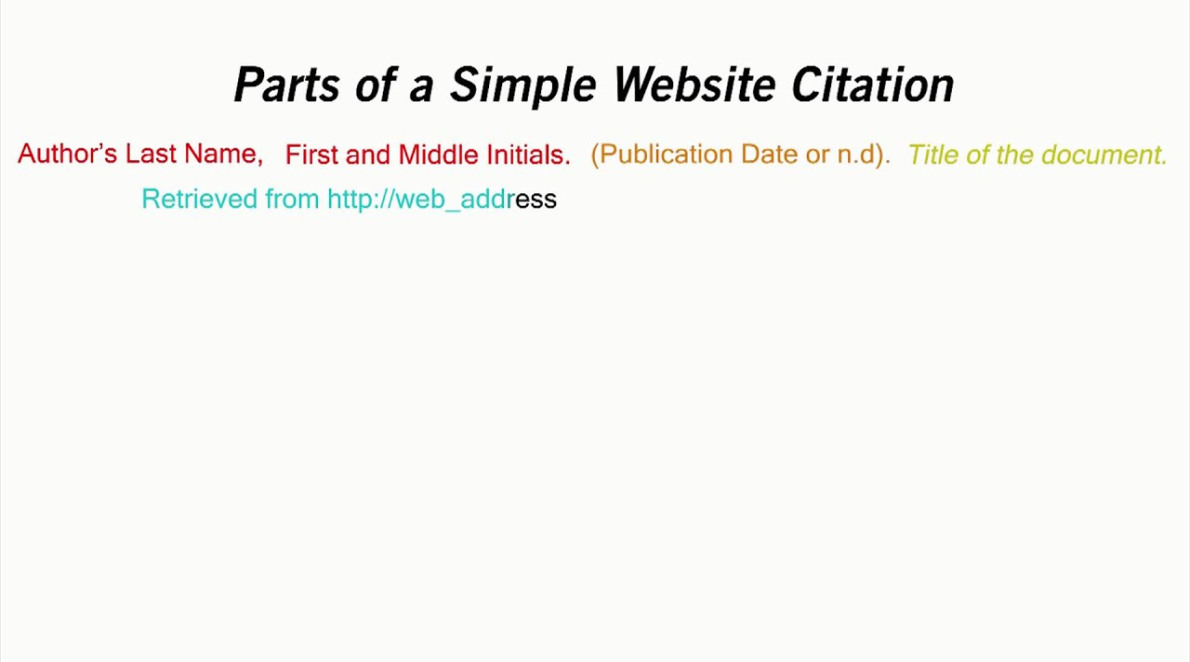Example of APA Citation for a Website
When writing academic papers or conducting research, it is crucial to cite your sources properly to give credit where it is due and avoid plagiarism. One commonly used citation style is the American Psychological Association (APA) format. In this article, we will explore an example of how to cite a website using APA guidelines.
What do you mean by APA citation?
APA citation is a set of rules and guidelines created by the American Psychological Association to ensure consistency and accuracy in citing sources in academic writing. It provides a standardized format for citing various sources, including books, articles, websites, and more. APA citation includes specific elements such as author names, publication dates, titles, and retrieval information.
How to cite a website in APA format?

When citing a website in APA format, you need to include the following information:
Author(s) or the organization responsible for the content
Publication date (if available)
Title of the page or article
Website name
URL (direct link to the specific page or article)
Access date (the date you accessed the information)

Here is an example of how to cite a website in APA format:
Author(s). (Year, Month Day). Title of the page or article. Title of the website. URL
Let’s consider an example:
Smith, J. (2022, March 15). The Importance of Sleep. Health Matters. https://www.healthmatters.com/importance-of-sleep
In this example, Smith, J. is the author of the article, The Importance of Sleep is the title of the page, Health Matters is the website name, and the URL is the direct link to the specific page. The access date is not required for static web pages, but it is recommended for dynamic content that may change over time.
What is known about APA citations for websites?
APA citations for websites are an essential part of academic writing and research papers. The format ensures that readers can easily locate and verify the sources you have used. By providing the necessary information, such as the author’s name, publication date, and URL, you enable others to access the same information and evaluate the credibility of your sources.
Using APA citations for websites also demonstrates your ability to follow academic standards and ethical practices. It shows that you respect the intellectual property of others and gives credit to the original creators of the content you have used in your work.
Solution for creating APA citations for websites
Creating APA citations for websites can be a straightforward process if you follow the guidelines and have the necessary information. However, it can sometimes be challenging to find all the required details, especially when websites do not explicitly provide them.
One helpful solution is to use citation generators specifically designed for APA format. These online tools allow you to input the necessary information, such as the website URL, author, and publication date, and they generate the citation in proper APA format. However, it is essential to double-check the generated citation for accuracy and completeness.
Another solution is to consult APA style guides or reliable online resources that provide examples and explanations of APA citations for various sources, including websites. These resources can help you understand the formatting requirements and provide guidance on how to adapt the citation when certain information is missing.
Additional Information
When citing websites in APA format, it is crucial to use the most up-to-date information available. Web pages can change or be removed, so it is important to include the date when you accessed the information. This allows readers to understand the context and verify the accuracy of the information at the time you used it.
Remember to check the specific requirements of your institution or publication when it comes to citation styles. While APA is widely used in the social sciences and academic writing, different disciplines may have their own preferred citation styles.
Conclusion
APA citations for websites are an integral part of academic writing, ensuring proper credit is given to the original authors and allowing readers to locate the information used in your research. By following the guidelines and providing accurate and complete citations, you demonstrate your commitment to academic integrity and ethical research practices. Utilize citation generators and style guides to simplify the process, but always double-check the generated citations for accuracy. Remember to include the access date when citing websites to provide context and ensure the reliability of your sources.
FAQs
1. Can I use a shortened URL in my APA citation?
It is recommended to use the full URL whenever possible to ensure that readers can access the exact webpage you referenced. However, if the URL is exceptionally long or the source explicitly provides a shortened URL, you may use it.
2. Should I include the access date if the webpage content is static?
If the webpage content is static and unlikely to change over time, the access date is not required. However, including the access date is still recommended, particularly for dynamic content or when there may be a possibility of changes or updates to the webpage.
3. What if the website author is unknown?
If the website does not provide an author’s name, you can use the organization or website name as the author in your citation.
4. Can I cite a webpage without a title?
In most cases, webpages have a title that you can use in your citation. However, if a webpage does not have a specific title, you can use a brief description of the page or article in quotation marks.
5. Where can I find more examples of APA citations?
You can find more examples and detailed explanations of APA citations in the official APA Publication Manual or reputable online resources such as university libraries or writing centers.